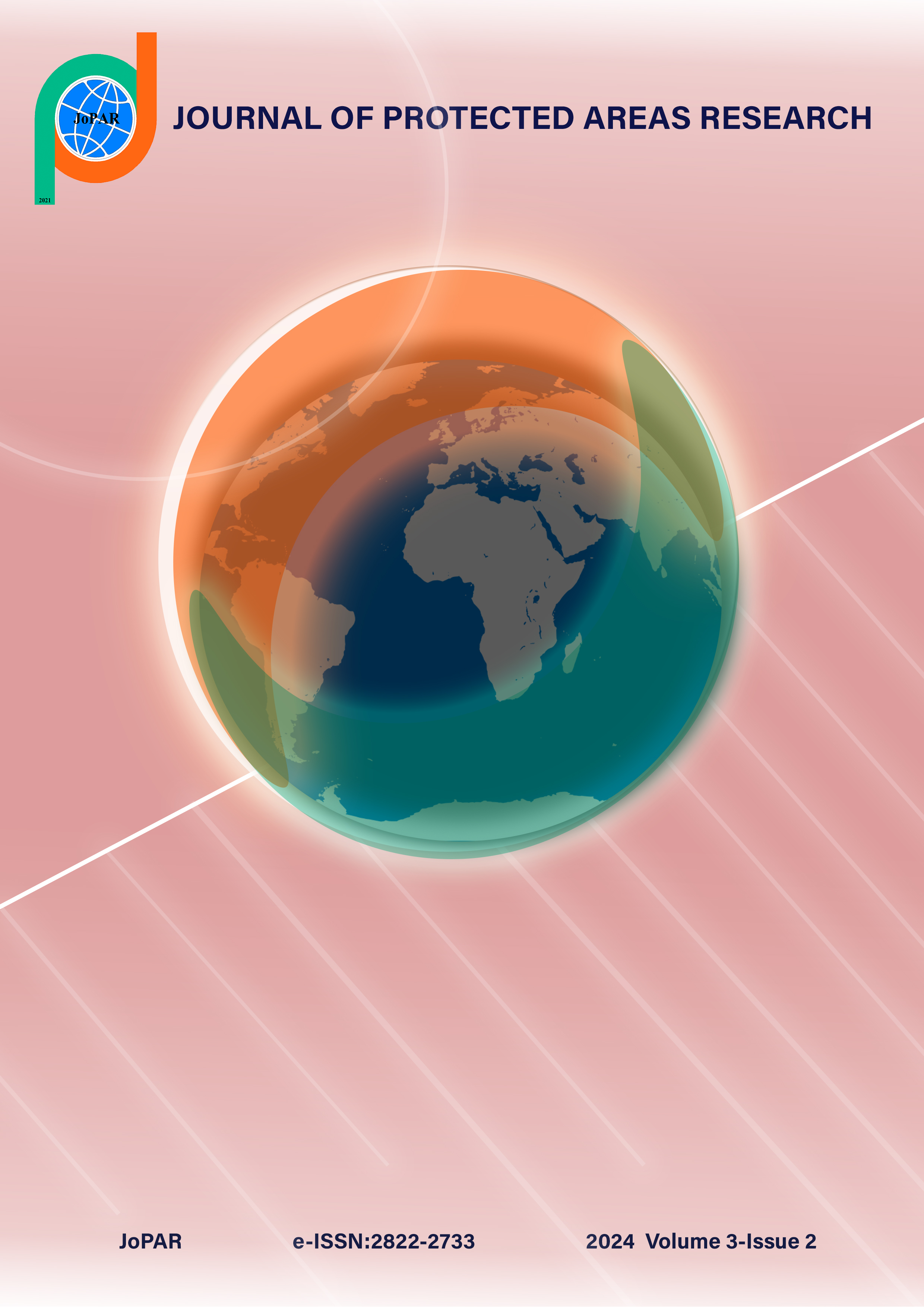Evaluation of Restoration Interventions in the Ancient Theater of Ephesus in Terms of National and International Conservation Principles
Efes Antik Tiyatrosu’ndaki Restorasyon Müdahalelerinin Ulusal ve Uluslararası Koruma İlkeleri Bağlamında Değerlendirilmesi
Keywords:
the Ancient Theater of Ephesus, Conservation and Restoration, Contemporary UseAbstract
Theaters, which can be integrated into contemporary life without altering their original construction purposes, are cultural heritages of documentary nature. International platforms established rules for their use for events and conservation of cultural traces they possess. The preservation and restoration efforts in theaters, aimed at bringing them back into modern life, have evolved over time, reflecting shifts in techniques and approaches from past to present. The study aims to emphasize why and how changing restoration techniques have been used in the theaters’ integration into contemporary life and to evaluate restoration works conducted over the years on these monuments in the context of national and international conservation legislation. The scope was determined as the Ancient Theater of Ephesus, where the first restoration works began with the Ephesus Festival organized in 1968, and continued subsequently for tourism-related events. A literature review covering the national and international statutes and laws was conducted to examine the changing restoration works over time, and findings from on-site observations were conveyed through plans and photographs.
References
Ahunbay, Z. (2010). Arkeolojik Alanlarda Koruma Sorunları Kuramsal ve Yasal Açılardan Değerlendirme. TÜBA-KED Türkiye Bilimler Akademisi Kültür Envanteri Dergisi (8), 103-118.
Aktüre, Z. (2012). Türkiye’nin UNESCO Dünya Mirası Listesi’ndeki Arkeolojik Alanlarına Yapılan Müdahalelerin Türlerine Göre Dönemlemesi. T.Kocatürk et al. (Eds.), TAYKON 2011 Tarihi Yapıları Koruma ve Onarım Sempozyumu in (pp.51-60). İstanbul: Yıldız Technical University
Altıntaş, F. (2008). Grek-Roma Tiyatroları ve Güney-Batı Anadolu’da Bu Dönemlerde İnşa Edilmiş Tiyatrolardan Örnekler (Master's thesis). Sosyal Bilimler Enstitüsü, Klasik Arkeoloji (Arkeoloji) Anabilim Dalı, Ankara Üniversitesi, Ankara.
Anabolu, U. M. (2001). İstanbul ve Anadolu’daki Roma İmparatorluk Dönemi Mimarlık Yapıtları, İstanbul: Kanaat Basımevi.
Atalay, E. (1973). Efes’de Büyük Tiyatro’nun Restorasyonu İçin Yapılan Kazılar ve Bu Kazılardan Elde Edilen Buluntular. R. Meriç & S. Türkoğlu (Ed.), Efes Harabeleri ve Müzesi Yıllığı-1 in (pp.49-55). İzmir: Efes Müzesi ve Harabeleri Dostları Derneği Yayınları.
Cobb, E. (2023). Osmanlı’nın İlk Demiryolu Tecrübesi: İzmir-Aydın Hattının Zorlu Yılları. Toplumsal Tarih Akademi (2), 8-24. Project Number: 22606121. Access Address (01.12.2023): https://dergipark.org.tr/tr/pub/ttakademi/issue/78535/1286498#article_cite
Council of Europe. (1997). Charter on the Use of Ancient Places of Performance.Access Address (14.04.2024): https://kumid.net/euproject/admin/userfiles/dokumanlar/arkeolojiilave03.pdf
Çorbacı, C. (2007). Antikçağ Tiyatrosu ve Günümüze Yansıması (Master's thesis). Sosyal Bilimler Enstitüsü, Klasik Arkeoloji Anabilim Dalı, Anadolu Üniversitesi, Eskişehir. Access Address (13.02.2024): https://tez.yok.gov.tr/UlusalTezMerkezi/tezDetay.jsp?id=9CgR-qVGvjSpBVyWhvkDWw&no=SeCOEpnQgk1zapstViBXRw
Erbalaban Yılmaz, E. (2021). Antik dünyanın gözdesi 'Efes Tiyatrosu' 3 yıl aradan sonra sanat için kapılarını aralıyor. Anadolu Ajansı. Access Address (01.02.2023): https://www.aa.com.tr/tr/kultur-sanat/antik-dunyanin-gozdesi-efes-tiyatrosu-3-yil-aradan-sonra-sanat-icin-kapilarini-araliyor/2333476
Hofbauer, M., Öztürk, A. & Styhler Aydın, G. (2017). Topografie und Forschungsgeschichte. F. Krinzinger & P. Ruggendorfer (Series Ed.), Das Theater Von Ephesos: Archaologischer Befund, Funde und Chronologie: Volume 2,1. Forschungen in Ephesos in (s. 1-15). https://doi.org/10.11588/diglit.61701
Ladstatter, S. (2012). Efes Antik Tiyatro Hayata Döndü. Hürriyet gazetesi. Access Address: https://www.hurriyet.com.tr/ege/efes-antik-tiyatro-hayata-dondu-21511843
Ladstatter, S. (2016). Efes’in Arkeolojik Alanlarındaki Konservasyon Stratejileri. E. Dündar, M. Koçak, S. Erkoç & Ş. Aktaş (Ed.). Havva İşkan’a Armağan Lykiarkhissa in (pp. 541-560). İstanbul: Ege Yayınları. https://www.academia.edu/34223073 Access Address 09 09 2023.
Ladstatter, S., Büyükkolancı, M., Topal, C. & Aktüre, Z. (2016). Ephesus. N. Ertürk & Ö. Karakul (Ed.), UNESCO World Heritage in Turkey 2016 in (s. 412-443). Ankara: Turkish National Commission for UNESCO. https://www.academia.edu/26349547 Access Address 09 09 2023.
Republic of Türkiye Ministry of Culture and Tourism. (2021). Republic of Türkiye Ministry of Culture and Tourism, General Directorate of Cultural Heritage and Museums Archive (2018-2021).
Selcuk Municipality. (2022). Republic of Türkiye Ministry of Culture and Tourism & Selçuk, Efes Yönetim Planı 2022-2027.Access Address (05.09.2023): https://kvmgm.ktb.gov.tr/TR-204384/ulusal-yonetim-planlari.html
Türkoğlu, İ. (Ed.) (2000). Efes rehberi. İstanbul: Ege Yayınları ve Avusturya Arkeoloji Enstitüsü.
Ürüm, A. T. (Ed.) (2014). Efes Kazıları: Jonh Turtle Wood’un Anıları. İstanbul: Arkeoloji ve Sanat Yayınları.
Yılmaz, B. (2019-2021). Personal archive.

Published
How to Cite
Issue
Section
License
Copyright (c) 2024 Journal of Protected Areas Research

This work is licensed under a Creative Commons Attribution-ShareAlike 4.0 International License.


